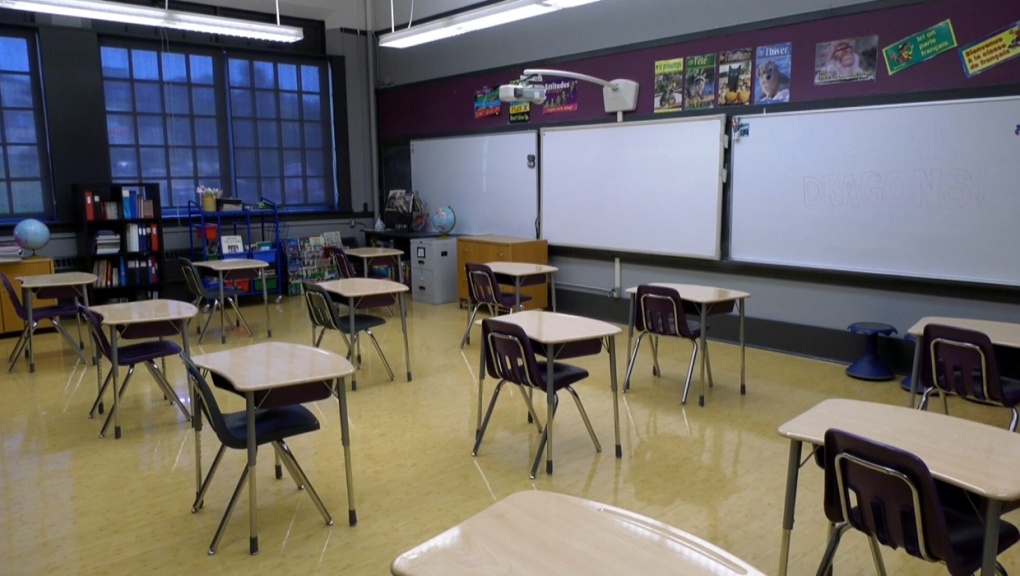COVID pandemic's long-lasting impact on children a major concern for Canadian parents: poll
 An empty Calgary classroom with desks spaced apart ahead of the start of the fall 2020 semester.
An empty Calgary classroom with desks spaced apart ahead of the start of the fall 2020 semester.
A survey conducted for Children First Canada found the vast majority of Canadian parents are worried about the toll the COVID-19 pandemic is having, and will continue to have, on their children.
"We know over the past two years that kids have been disproportionately impacted by the pandemic," said Sara Austin, Children First Canada president and CEO, in an interview with CTV News Calgary. "And with Canada approaching the second anniversary of the pandemic, we wanted to gauge how Canadians were feeling about the future of kids."
The survey, conducted by Maru/Blue, suggests there's significant cause for concern and parents are calling for prioritized government spending to assist Canadian youth.
"What we heard was that 85 per cent, an overwhelming majority, are concerned about the future of our children, and fully one-third are very concerned particularly about the impacts of the pandemic, that kids are not just bouncing back. That they're going to need significant support to address the huge impacts that they've experienced over the past two years."
According to the poll, 75 per cent of Albertans believe that children's lives are collectively worse off today than they were pre-pandemic and 85 per cent of all respondents say the pandemic has had a negative impact on the social and emotional development of children.
Austin says the lifting of COVID-19-related restrictions does not mean the pandemic-related fallout is anywhere close to ending.
"(Children) have experienced a very significant learning loss because of the prolonged school closures. They've had impacts to their mental health —the social isolation that kids experienced during school closures but also from the stressors that parents and families experienced with income loss — with struggling to just deal with all the pandemic restrictions, that have taken a toll on children's mental health and their social development.
"This impacts their physical health. You think about how many kids were losing out on not only just things like recess, but also organized sports like hockey and gymnastics that they were cut off from and many kids have been reluctant to return to sports. These things are not going to just magically get better. We're going to need to support our kids in the weeks, months and years to come."
Children First Canada says that while the long-term impacts of remote learning as well as in-class masked learning remain unknown, students have already lost out on "so much learning time with school closures and with the ping-ponging back and forth." Austin says the approach of governments hasn't always aligned with the needs of children and there are legitimate fears as case counts begin rising once again.
"The Canadian Pediatric Society strongly recommended that masking remained in place in classrooms until more children could be vaccinated. Governments have ignored that advice," said Austin. "So many parents and kids are feeling vulnerable right now with their kids in the classrooms in the unmasking situation and what that could mean, particularly for children with disabilities or complex medical needs and compromised immune systems. We're already seeing rates of COVID starting to tick up in our province and in other parts of the country. It's a very worrisome sign."
For additional details on the survey visit Children First Canada.
The survey of 1,506 adults, selected at random from Maru Voice Canada's online panelists, was conducted on March 8-9. The survey's estimated margin of error is +/- 3.0 per cent, 19 times out of 20.
CTVNews.ca Top Stories

London Ont. Liberal MPs say that Trudeau is taking time to reflect on his future
Both of London’s Liberal MPs are choosing their words carefully when it comes to their party's leadership future. They were asked about the situation in Ottawa at Friday's housing announcement in London.
Blake Lively accuses 'It Ends With Us' director Justin Baldoni of harassment and smear campaign
Blake Lively has accused her 'It Ends With Us' director and co-star Justin Baldoni of sexual harassment on the set of the movie and a subsequent effort to “destroy' her reputation in a legal complaint.
Trudeau's 2024: Did the PM become less popular this year?
Justin Trudeau’s numbers have been relatively steady this calendar year, but they've also been at their worst, according to tracking data from CTV News pollster Nik Nanos.
New rules clarify when travellers are compensated for flight disruptions
The federal government is proposing new rules surrounding airlines' obligations to travellers whose flights are disrupted, even when delays or cancellations are caused by an "exceptional circumstance" outside of carriers' control.
Sask. police investigating mischief incident after bomb report in school
Prince Albert police are investigating a mischief incident after a bomb report in a school Friday afternoon.
Wild boar hybrid identified near Fort Macleod, Alta.
Acting on information, an investigation by the Municipal District of Willow Creek's Agricultural Services Board (ASB) found a small population of wild boar hybrids being farmed near Fort Macleod.
Manhunt underway after woman, 23, allegedly kidnapped, found alive in river
A woman in her 20s who was possibly abducted by her ex is in hospital after the car she was in plunged into the Richelieu River.
Calling all bloodhounds: These P.E.I. blood donors have four legs and a tail
Dogs are donating blood and saving the lives of canines at the University of Prince Edward Island's Atlantic Veterinary College in Charlottetown.
Summer McIntosh makes guest appearance in 'The Nutcracker'
Summer McIntosh made a splash during her guest appearance in The National Ballet of Canada’s production of 'The Nutcracker.'

































